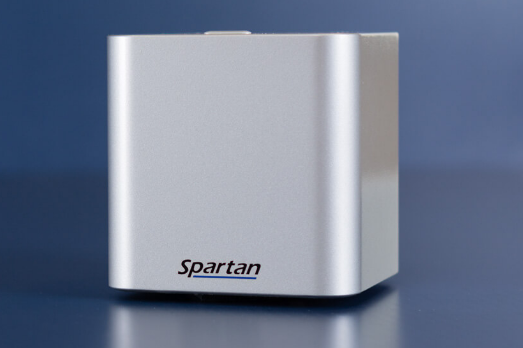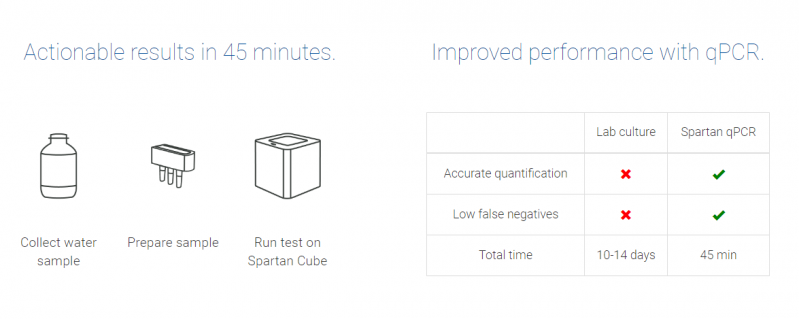World’s First On-site Legionella DNA Test to Prevent Legionnaires’ Disease in Buildings
Published on by Water Network Research, Official research team of The Water Network in Technology
Spartan Bioscience announced the product launch of the Spartan Legionella Detection System. It is the first on-site DNA test for Legionella and it can detect and quantify Legionella bacteria in 45 minutes.

Image source: Spartan Bioscience
The system consists of a coffee-cup-sized, portable DNA analyzer called the Spartan Cube® and a single-use disposable test cartridge. The system is the winner of the 2018 AHR Expo Innovation Award for Indoor Air Quality, as judged by the American Society of Heating, Refrigerating and Air-Conditioning Engineers (ASHRAE).
Legionella is a common environmental bacterium that can infect the cooling towers of Heating, Ventilation, and Air Conditioning (HVAC) systems of large buildings. Infected cooling towers release aerosolized water droplets contaminated with Legionella into the surrounding air.
Building occupants who breathe in these water droplets can develop Legionnaires’ disease, a potentially fatal pneumonia. Legionnaires’ disease symptoms can include coughing, shortness of breath, chest pain, and nausea.
Globally, there are hundreds of thousands of office towers, hospitals, hotels, shopping malls, and other large buildings at risk for infection by Legionella. Weekly testing with the Spartan system can detect Legionella bacterial growth early and allow cleaning and decontamination of the cooling tower before Legionella reaches dangerous levels to human health.
Currently, some buildings are performing monthly Legionella bacterial culture testing, in which a water sample is shipped to a third-party lab and grown on a Petri dish for 10-14 days. This turnaround time is too slow because Legionella can reach outbreak levels in as few as 7 days.
In addition, the culture test method can underestimate the Legionella concentration on site. The Centers for Disease Control and Prevention (CDC) found that Legionella culture can underestimate actual Legionella levels by a factor of 10 or more. Culture incorrectly reported that water samples were negative for Legionella an average of 11.5 percent of the time when in fact they were positive.
Due to the limitations of Legionella bacterial culture testing, cities that have implemented mandatory testing with this method continue to have outbreaks of Legionnaires’ disease. For example, New York City implemented mandatory testing regulations in 2016 but has had several fatal outbreaks in 2017.
Spartan has developed the first on-site Legionella DNA test to solve the problems of using lab-based bacterial culture. The technology is based on a highly-accurate Nobel-Prize winning chemistry called quantitative Polymerase Chain Reaction (qPCR) and it is designed to meet the objectives of ISO/Technical Standard 12869:2012: “Water quality--Detection and quantification of Legionella spp. and/or Legionella pneumophila by concentration and genic amplification by quantitative polymerase chain reaction (qPCR)”.

Image source: Spartan Bioscience
The innovation was purchased by the Government of Canada, through the Build in Canada Innovation Program (BCIP), and is being tested by Public Services and Procurement Canada (PSPC). Commercialization of the innovation was supported by the National Research Council of Canada Industrial Research Assistance Program (NRC IRAP). More product details are available at: https://www.spartanbio.com/cube/Legionella.
“On-site Legionella DNA testing is the first practical way to monitor and prevent Legionella outbreaks in buildings,” said Paul Lem, M.D., CEO of Spartan Bioscience. “With widespread testing, there is the potential to basically eradicate Legionnaires’ disease.”Legionella DNA testing is the first practical way to monitor and prevent Legionella“On-site
Source: Spartan Bioscience
Media
Taxonomy
- Treatment
- Technology
- Pollution
- Building Design
- Pollution
- Sustainable Building
- Legionella training
- Disinfection